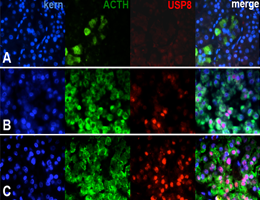Mutations drive unrestrained secretion

Benign tumors in the pituitary gland lead to uncontrolled secretion of the stress hormone cortisol by the cells of the adrenal cortex. An international research effort has now characterized a new mechanism that triggers the syndrome.
Many individuals who suffer from Cushing syndrome are easy to recognize: They tend to be overweight particularly around the waist, and have round faces and bull necks. In addition to these obvious features, most of them have high blood pressure, develop muscle weakness, become diabetic and are extremely susceptible to infection. Cushing syndrome can often be treated effectively by surgical intervention, but patients succumb to infections or cardiovascular disease if the condition is left untreated.
In their efforts to understand how benign tumors in the pituitary provoke the development of Cushing's disease, researchers based in Munich, Würzburg and Tokyo led by Professor Martin Reincke (Director of LMU's Medical Clinic IV at Munich University Medical Center) have now pinpointed a novel molecular mechanism responsible for the condition. The results of the study have just appeared in Nature Genetics.
The perils of incessant secretion
All of the symptoms that typify Cushing syndrome are attributable to the unregulated secretion of the hormone cortisol – generally referred to as cortisone. Cortisol is normally released into the bloodstream only in stress situations, and helps the organism to cope with the challenge. However, when secreted in an uncontrolled fashion, the result is physiological havoc. Cortisol is synthesized in, and secreted by specialized cells in the adrenal cortex in response to the binding of a different hormone, the adrenocorticotropic hormone (ACTH). ACTH in turn is produced in the pituitary gland. Excessive cell proliferation in the pituitary can result in the formation of benign tumors (adenomas), which may lead to overproduction of ACTH and a corresponding increase in the level of circulating cortisol. However, the connecting links between the two processes are incompletely understood.
"We have now shown that tumor cells in more than one-third of patients with Cushing's disease carry a mutation in one specific gene, which codes for an enzyme called ubiquitin-specific protease 8," says Martin Fassnacht (Würzburg University Hospital), one of the authors of the publication. The mutation was discovered in the course of a detailed genetic characterization of benign tumors of the pituitary gland that overproduced ACTH.
Protease defect sets off a chain reaction
Ubiquitin-specific protease 8 (USP8) is one of a family of enzymes which play a key role in the destruction of proteins that are required only transiently by cells. One such protein is the receptor for epidermal growth factor (EGF), which is degraded and disposed of only when the USP8 gene is inactive, and no USP8 protein is present. The collaboration found that the effect of the mutations identified in pituitary tumor tissues is to keep the USP8 permanently active. As a consequence, the EGF receptor escapes demolition, and is instead recycled to its site of action on the cell membrane. The upshot of this is a life-threatening chain reaction, in which unrestrained synthesis of ACTH leads to uninhibited secretion of cortisol. "The identification of mutations in USP8 is a significant finding, because it opens up entirely new diagnostic and therapeutic approaches to the management of Cushing's disease," Martin Reincke adds.
Long-term focus on Cushing's disease
Indeed, this is not the first time that the collaboration between the teams in Munich and Würzburg has shed light on the pathogenesis of Cushing's disease. The two groups have previously identified mutations in a gene that is expressed in the adrenal cortex as a frequent cause of the pathological secretion of cortisol in a different patient population. The results of that study appeared in February 2014 in the "New England Journal of Medicine". And only last week, a paper providing a detailed characterization of the molecular effects of the latter set of mutations was published in "Nature Communications".
More information: "Mutations in the deubiquitinase gene USP8 cause Cushing's disease." Nature Genetics (2014) DOI: 10.1038/ng.3166















